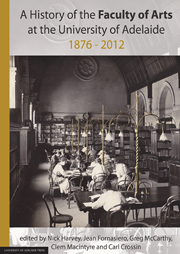Book contents
- Frontmatter
- Contents
- List of Contributors
- 1 The Faculty of Humanities and Social Sciences and the BA Degree at the University of Adelaide since 1876
- 2 Webs of Significance: an Ethnographer's Account of Anthropology at the University of Adelaide from 1973 to 2011
- 3 The History of the Centre for Asian Studies at the University of Adelaide
- 4 Classics at the University of Adelaide (1874–2012)
- 5 English and Creative Writing: ‘the abode of … literature; the home of poetry and fiction’
- 6 A Tale of Resilience: the History of Modern European Languages at the University of Adelaide
- 7 Geography, Environment and Population at the University of Adelaide, 1904–2012
- 8 Gender Studies and Social Analysis
- 9 History
- 10 The History of Aboriginal Languages and Linguistics at the University of Adelaide
- 11 The Digital, Participatory and International Turn: Media at the University of Adelaide
- 12 Musical fusions
- 13 Philosophy at the University of Adelaide
- 14 Politics at the University of Adelaide
- Appendices
11 - The Digital, Participatory and International Turn: Media at the University of Adelaide
Published online by Cambridge University Press: 05 June 2013
- Frontmatter
- Contents
- List of Contributors
- 1 The Faculty of Humanities and Social Sciences and the BA Degree at the University of Adelaide since 1876
- 2 Webs of Significance: an Ethnographer's Account of Anthropology at the University of Adelaide from 1973 to 2011
- 3 The History of the Centre for Asian Studies at the University of Adelaide
- 4 Classics at the University of Adelaide (1874–2012)
- 5 English and Creative Writing: ‘the abode of … literature; the home of poetry and fiction’
- 6 A Tale of Resilience: the History of Modern European Languages at the University of Adelaide
- 7 Geography, Environment and Population at the University of Adelaide, 1904–2012
- 8 Gender Studies and Social Analysis
- 9 History
- 10 The History of Aboriginal Languages and Linguistics at the University of Adelaide
- 11 The Digital, Participatory and International Turn: Media at the University of Adelaide
- 12 Musical fusions
- 13 Philosophy at the University of Adelaide
- 14 Politics at the University of Adelaide
- Appendices
Summary
The Media discipline has a vibrant, entrepreneurial history, marked by creative innovation and problem-solving capacities. It emerged from cross-disciplinary teaching from the late 1970s to 2002 and then, as a sub-discipline of English, constructed the Bachelor of Media. It became a separate intellectual and administrative group in late 2006, growing rapidly and known today for innovative teaching and research, and lively engagement with its profession, community and industry. In a relatively short period, it has twice recalibrated the original degree, and established an Honours program, a growing postgraduate cohort, research agendas, valuable international connections, and a record of scholarship and publications, which includes the dynamic field of digital media.
Program and discipline differ markedly from the more modest proposals in 2001. The crucial turn in 2006 to a discipline-defining contemporary program in digital and participatory media, with a distinctive, attractive niche among its South Australian competitors, was not easy to achieve. Media education's beginnings in technical tertiary institutions as ‘craft’ training explain certain strongly held misconceptions about the value of critical and creative media studies — which also produce technically adept graduates — to a prestigious research university. Those leading Media developments have encountered the common challenges originating from prevalent preconceptions, even prejudices, about contemporary media, which have in turn shaped judgements about tertiary media education; and a supposed contradiction in the discipline's ‘theory plus praxis’ approach has at times impeded the discipline's establishment.
- Type
- Chapter
- Information
- A History of the Faculty of Arts at the University of Adelaide1876-2012, pp. 299 - 324Publisher: The University of Adelaide PressPrint publication year: 2012



